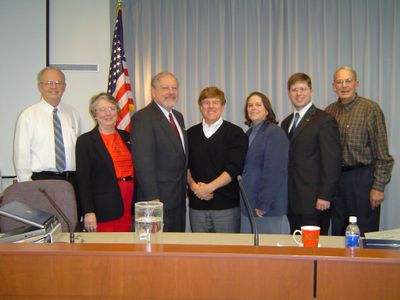Councilman asks if dawdlers create risk
State safety program assessing Route 27 from Trent to Rockford

What’s more rare than a traffic ticket for going too slow?
A politician who asks that question, one might have supposed.
Elected officials spend millions on road improvements to keep traffic moving, but they seldom address dawdlers.
Then along comes Spokane Valley City Councilman Dick Denenny.
“Do they ever look at traffic impediment, slow traffic?” Denenny asked during a report to the council last week on an ongoing project to improve safety on 20 miles of state Route 27, from Trent Avenue to Rockford.
Denenny said he often hears about seat belts during traffic safety crackdowns, “but I never hear of an emphasis patrol on slow driving, on having people backed up, which to me is a cause of a lot of the accidents.”
Limiting enforcement to speeders is like prosecuting underage smokers and ignoring the stores that sell cigarettes, he said.
“I ask the question because I can,” Denenny said, declaring himself an enthusiastic supporter of the Route 27 corridor safety project.
Calling himself “a soldier, not a politician,” Spokane Valley Police Detective Don Manning said he wouldn’t sugarcoat his answer.
“I’m an old traffic cop,” Manning said. “I don’t know how you would do a slow-driving enforcement. You’d have to drive down the road looking for a line of traffic and try to pass everybody to catch the slow driver. That’s kind of difficult to do.”
Still, Manning said, if he gets behind people driving “substantially under the speed limit, and if there’s five or more vehicles behind us,” he stops the slowpokes to find out why they’re moving so slowly.
“But I don’t think we see that as a cause of a lot of the crashes on the SR 27 corridor,” Manning added.
However, Marion Lee, a Spokane Regional Health District injury prevention specialist, said representatives of the Coeur d’Alene Casino in Worley, Idaho, expressed the same concerns as Denenny when she contacted them as head of the Route 27 safety program’s education committee.
“They were very concerned about that issue,” Lee said, because many customers travel SR 27 on their way to and from the casino.
“If you’ve got someone that’s traveling a lot slower, then you’re potentially going to have the guy or the gal at the back that’s going to take risks that they shouldn’t,” Lee said. “I will relay that back to (the Washington Traffic Safety Commission, which is paying for the SR 27 safety program) and say that not only did we hear that from a casino partnership contact, we also heard that again at the council.”
The multiagency project involves contacts with governmental, civic and private organizations as well as extra enforcement by police and state liquor control agents.
The grant-funded project has been in operation about a year, and is expected to continue through next spring.
Lee said 643 traffic tickets have been written so far, 382 for speeding. The fines will help the state budget while improving safety, she said.
At first, she said, police reported that issuing tickets was “like shooting fish in a barrel,” but motorists have improved their behavior.
Manning said rules for grant-funded police overtime call for officers to write three tickets per hour, “and that’s actually quite a few.”
He said grant-paid officers aren’t limited to Route 27 in Spokane Valley, where it is better known as Pines Road. Rules allow the officers to range as far east as Evergreen Road and as far west as Argonne Road, Manning said.